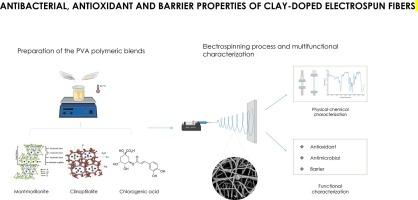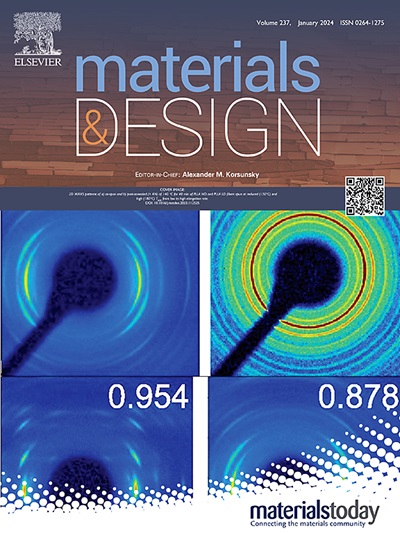Antibacterial, antioxidant and barrier properties of clay-doped electrospun fibers
IF 7.6
2区 材料科学
Q1 MATERIALS SCIENCE, MULTIDISCIPLINARY
引用次数: 0
Abstract
Nowadays, packaging technologies have been extensively developed, including active and intelligent packages able to promote quality, safety, and the product shelf life. At this purpose, the aim of the study was focused on the design and development of polyvinyl alcohol-based nanofibers doped with two natural clays, montmorillonite or clinoptilolite, and loaded with chlorogenic acid, as nanofibrous membranes to control microbial contamination and oxidative state upon direct contact. The results showed that the 1 % w/w clay doping was the optimal concentration to obtain continuous and uniform nanofibers. In addition, chlorogenic acid loading (5 % w/w) into the nanofibers did not change the systems morphology, resulting in a chlorogenic acid sustained release, achieving 100 % within 24 h for all the systems with enhanced antioxidant and antimicrobial activities. Depending on their structure, the presence of the clays mineral was able to affect the aqueous vapor permeability. These results suggested the promising applications of the clay doped polyvinyl alcohol-based nanofibrous membranes as smart advanced material able to control microbial contamination and oxidative degradation to be used in biomedical field or as active packaging.

掺粘土电纺纤维的抗菌、抗氧化和阻隔性能
如今,包装技术得到了广泛的发展,其中包括能够提高质量、安全性和产品保质期的活性智能包装。为此,本研究旨在设计和开发掺杂了蒙脱石或绿原酸两种天然粘土的聚乙烯醇基纳米纤维,作为纳米纤维膜来控制微生物污染和直接接触时的氧化状态。结果表明,1% w/w 粘土掺杂是获得连续均匀纳米纤维的最佳浓度。此外,在纳米纤维中添加绿原酸(5% w/w)不会改变系统的形态,从而实现了绿原酸的持续释放,在所有系统中,绿原酸在 24 小时内的释放量都达到了 100%,并增强了抗氧化和抗菌活性。根据其结构的不同,粘土矿物的存在会影响水蒸气的渗透性。这些结果表明,掺杂粘土的聚乙烯醇基纳米纤维膜作为智能先进材料具有广阔的应用前景,能够控制微生物污染和氧化降解,可用于生物医学领域或活性包装。
本文章由计算机程序翻译,如有差异,请以英文原文为准。
求助全文
约1分钟内获得全文
求助全文
来源期刊

Materials & Design
Engineering-Mechanical Engineering
CiteScore
14.30
自引率
7.10%
发文量
1028
审稿时长
85 days
期刊介绍:
Materials and Design is a multi-disciplinary journal that publishes original research reports, review articles, and express communications. The journal focuses on studying the structure and properties of inorganic and organic materials, advancements in synthesis, processing, characterization, and testing, the design of materials and engineering systems, and their applications in technology. It aims to bring together various aspects of materials science, engineering, physics, and chemistry.
The journal explores themes ranging from materials to design and aims to reveal the connections between natural and artificial materials, as well as experiment and modeling. Manuscripts submitted to Materials and Design should contain elements of discovery and surprise, as they often contribute new insights into the architecture and function of matter.
 求助内容:
求助内容: 应助结果提醒方式:
应助结果提醒方式:


